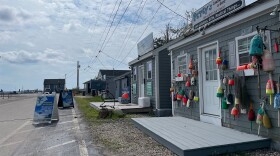Like many people across the country, students on college campuses have been protesting Israel’s war in Gaza. Students at UMass Amherst have conflicted feelings about returning to campus this fall – with classes starting Tuesday.
At the end of last semester, police clashed with protesters on campus, arresting more than 130 students, faculty and community members. They’d set up an encampment – with tents and wooden barriers – in solidarity with Palestine, and to urge the school to cut financial ties with military contractors.
"These are our students. These are our kids! They are peacefully protesting. Shame on you!" a faculty member at UMass shouted at campus and state police on May 7.
Footage of police breaking down the barriers and arresting protesters was uploaded to Instagram by UMass Amherst Students for Justice in Palestine and Faculty for Justice in Palestine. These videos and others were widely circulated across social media platforms.
Since the arrests, UMass Chancellor Javier Reyes has faced criticism from the Massachusetts ACLU and even U.S. Representative Jim McGovern for ordering police to clear the encampment. And Reyes – who has defended the move as a public safety measure – quickly lost votes of no confidence from student government and the faculty.
At commencement, dozens of graduating seniors walked out of McGuirk Stadium before Reyes' turn speak, staging their own graduation ceremony.
The students were arrested at the May protest returned to court this summer with some cases getting resolved while others may still go to trial. That’s in addition to facing university disciplinary proceedings.
Associate history professor Kevin Young, who was arrested during the encampment, said he was anxiously waiting for a positive shift from the administration this summer.
"We just haven't seen it. None of the news this summer has been encouraging in the least," Young said in a recent interview. "In June, the Board of Trustees reneged on a promise made to the student trustee from UMass Amherst to consider the divestment resolution that he had submitted to them. It doesn't leave me optimistic about the fall.”
“Their big talking point has been that they want to promote free and open dialogue on campus, but they've rejected any sort of attempts for us to try and engage in dialogue," said Eric Strong, a rising junior and a member of Students for Justice in Palestine.
This fall, Strong and other say they'll continue to push their demands.
"Holding both the fight for divestment and the fight for free speech on college campuses. Because those two are so interrelated," Strong said. "Our focus is definitely going to be trying to get more people engaged in pro-Palestine activism, informed about Israel and Palestine, provide a space for people to talk about and learn about Palestine and the conflict going on.”
Even students not involved in the any activism around the war still felt the tension on campus, including rising senior Perry Heard.
“I'm very interested and curious to see what will happen and how this year will go, considering how poorly handled it was before," Heard said. "Even like videos on Instagram, you saw what was going on — like nah, that wasn't, I don't think that was right.”
Ever since the Hamas attacks in Israel last October, students have claimed a rise in anti-Palestinian and anti-Semitic incidents on campus.
Rising junior Hadass Novick, experienced that.
“I have a little Israeli flag on my student ID from an event at the beginning of the year, before October 7th, from when I first showed up on campus and went to Hillel," she said. "I got a little Israeli flag sticker and I know someone in class saw that sticker and moved seats to not sit with me after telling me to go screw myself.”
Novick is the event coordinator for the Students Alliance for Israel. She said her goal for this year is to engage in constructive dialogue with other groups on campus.
“I hope that — it might be a little wishful thinking — but I hope that maybe we can work together to have events that support both sides," Novick said. "Because you don't have to be anti-Israel to be pro-Palestine. Like, the two should not be on opposite sides.”
Rabbi Aaron Fine, the executive director of Hillel, the Jewish community center at UMass, said the end of last year was a challenge. But Fine has hope for the new semester.
“I think that we've seen way too much destructive disagreement on campus in the last year, but really, disagreement is not a bad thing," he said. "It's a way we learn. It's a way that we figure out solutions together that none of us may have all the right answers.”
UMass did not make Reyes or any university official available for an interview for this story. But, in an email to students and faculty in August, Reyes said UMass is “committed to the free and open exchange of ideas.”
Reyes also provided an update on the Campus Demonstration Policy Task Force, announced in June, which consists of students, faculty and administrators. The group is reviewing the university’s rules for on-campus protests and will make recommendations.
And, with the high likelihood of more protests — and more tension, Reyes said the task force will soon complete its work.




